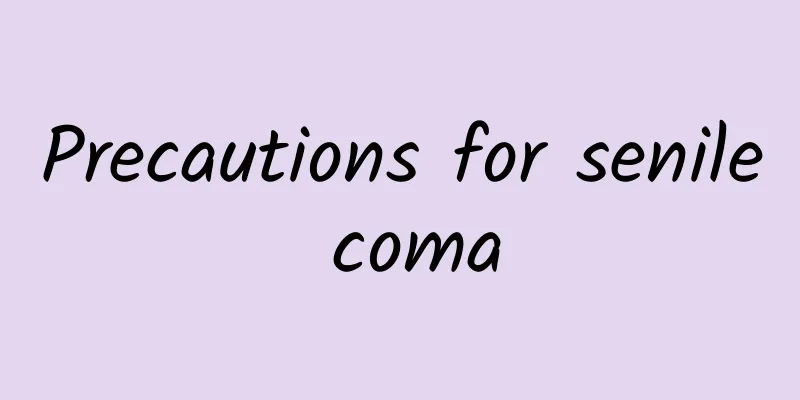What are the effects of excessive anesthesia on people?

|
The use of anesthetics is very common nowadays. Many female friends who love beauty need anesthesia when they go to plastic surgery hospitals for rhinoplasty and other surgeries. However, the dosage of anesthesia is very critical, and everyone needs to go to a regular professional hospital for it. If too much anesthesia is accidentally given, the harm to the human body cannot be underestimated. Some children have even had their intellectual development affected due to too much anesthesia. In addition, scientific preoperative treatment is required before anesthesia surgery. Preoperative treatment for local anesthesia 1 Preoperative visit It must be emphasized that the patient's preoperative preparation is a key factor in determining the success of local anesthesia. Preoperative visits allow the anesthesiologist to establish a close relationship with the patient and ensure the patient's cooperation, thus making local anesthesia operations easier. It is of great help to the anesthesiologist if he or she has had experience with local anesthesia. If an abnormal sensation is to be induced during the nerve block procedure, the patient should be informed in detail of the issues related to the abnormal sensation. If the patient will remain awake during surgery, the anesthesiologist should carefully explain to the patient that they may still have some sensation during surgery and that they may be able to feel movement, warmth, or cold; otherwise, the patient may interpret various stimuli as pain, causing the anesthesiologist to take unnecessary measures on the patient. A good approach to the preoperative visit is to: ① point out to the patient the advantages of the chosen local anesthetic method - early recovery, no postoperative pain, low incidence of nausea and vomiting, etc.; and ② explain to the patient what he will experience before, during, and after the nerve block. Anesthesiologists often need to reassure patients that they will not see the surgical procedure during surgery. In addition, anesthesiologists should inform patients that motor nerve blockade after surgery may last longer than sensory nerve blockade. 2 Patient preparation As with patients under general anesthesia, patients undergoing extensive nerve block should be fasting from midnight on the day of surgery. Patients scheduled for a peripheral nerve block may eat a light meal, such as tea and toast, 4 hours before the scheduled start of surgery. Patients may be allowed to take their normal medications at regular times with a sip of water if there are no contraindications. 3 Premedication Although some patients do not need premedication after a preoperative visit by the anesthesiologist and a detailed explanation of the proposed local anesthetic procedure, most patients need to use premedication. 4 Commonly used drugs Opioids: Patients with fractures or other painful diseases require analgesic treatment. This can make patient transfer to the operating room and positioning for neurological procedures involving local anesthesia less painful. In this setting, opioids are well suited, although these drugs have many properties that are unfavorable to patients undergoing local anesthesia. What are the effects of excessive anesthesia on people? If an overdose of anesthetics is taken, generally speaking, the side effects are minor and will be slowly metabolized. However, some people have a more severe reaction to anesthetics. It is recommended not to worry, just get more rest and it will slowly be metabolized. Anesthetics are divided into two categories: one is general anesthesia, which is drugs that are inhaled through the respiratory tract or injected intravenously into the body to cause general anesthesia; the other is local anesthesia. That is, an anesthetic suitable for the local area of surgery. The most serious consequence of anesthesia overdose is death. Whether it is a local anesthetic or a general anesthetic, excessive entry into the blood circulation can cause inhibition of circulation and breathing. As long as local anesthetics do not enter the blood, they will not have much impact on people. When they are directly injected into the blood, or the blood circulation in the medication area is particularly rich, causing the local anesthetic to enter the blood, it will produce mild or severe poisoning reactions, such as tinnitus, dizziness, loss of consciousness, etc., in severe cases it can cause respiratory arrest, cardiac arrest, and threaten life. But if rescue is timely, there will generally not be serious consequences. In fact, the dangers of anesthesia are not just death. Specifically, they can be divided into three categories: the first is "shallow anesthesia", which will cause a high stress response, that is, the patient will feel pain; the second is "improper sleeping anesthesia", which will cause the patient to be conscious during the operation and have feelings during the operation, such as feeling that the internal organs are being pulled; the third is "too deep anesthesia", which will increase the early postoperative mortality rate. What are the side effects of anesthetics? Anesthetics can cause circulatory collapse and cardiac arrest In terms of the effects of anesthetics, after general anesthetics are inhaled from the respiratory tract or injected into the human body, they quickly reach the brain through blood circulation, paralyze the central nervous system, and cause the patient to lose consciousness, resulting in general anesthesia. Local anesthetics refer to anesthetics used in local areas during surgery to block local nerve conduction. Prevents pain stimulation from the surgical site from being transmitted to the brain. Achieve the effect of suppressing pain. When talking about the harm of anesthetics to the human body, any drug has its pros and cons, and anesthetics are no exception. They are harmful to the human body to a certain extent. For example, general anesthetics can inhibit brain function, affect breathing, cause hypoxia, and even lead to circulatory failure and cardiac arrest. Although local anesthetics act locally, they are highly toxic. Once poisoning occurs, it can also lead to respiratory and cardiac arrest. This is just a side effect of the anesthetic itself. Anesthetics have a great impact on children's organs Because children's organs are not fully developed and their body's compensatory functions are weaker than those of adults, anesthesia accidents are more likely to occur. Therefore, for older children, if they can really cooperate during the operation, it is better to avoid anesthesia as much as possible, so that the safety factor will be relatively improved. However, for younger children, the operation can only be successfully completed under anesthesia. Parents do not have to worry about affecting their children's intelligence and refusing anesthesia. Of course, as a special drug, anesthetics also have certain side effects, and the anesthesia process is not as simple as inserting a needle and making the child fall asleep. It requires a professional anesthesiologist to carefully select the indications and master the drug dosage before it can be used safely. During the operation, a highly responsible anesthesiologist is needed to carefully observe the child's reaction to the drug and surgery, and take effective countermeasures for possible accidents. Only in this way can the operation be carried out smoothly and the occurrence of accidents can be minimized and avoided. |
>>: Hemorrhoids block the anus and make defecation difficult
Recommend
How to take Maca powder to fight fatigue
After entering society, the only feeling many peo...
What Chinese herbal medicine can enhance sexual performance
Many Chinese herbal medicines have a certain aphr...
What foods should I eat if I have thin hair?
Thin hair and severe hair loss are situations tha...
Time for decoction of tonic medicine
You can buy Chinese medicine at a pharmacy and bo...
The safest method of postpartum contraception
For women who have just given birth, they can hav...
How to remove stitch scars
When our bodies are traumatized and left with wou...
What are the side effects of face-lift injections?
The face-slimming injection is a botulinum toxin ...
How long does the mesodermal effect last?
With the development of medicine and science, the...
What to eat to detoxify and beautify? Eat these two recipes regularly for the best results
Foods that have detoxifying and beauty-enhancing ...
What causes swollen abdominal lymph nodes?
Abdominal lymphadenopathy is a common condition t...
What does it mean when a mole grows near a woman’s private parts?
A woman's private parts are very important bec...
What is the reason why women have bad breath?
Bad breath is a problem that bothers many people....
What causes back itching?
In daily life, we often see some middle-aged and ...
TCM Health Care Course Content
my country's traditional Chinese medicine cul...
Usage and dosage of Lingzhi
Ganoderma lucidum is a medicinal herb with relati...









